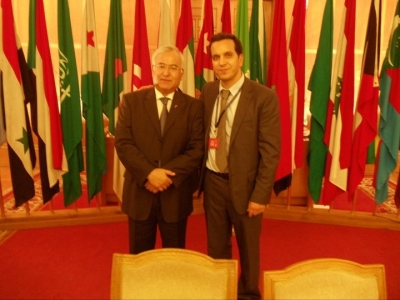Building bridges with the Arab world
Research news
People of Arab descent living in the West are the key to solving many of the problems of the Middle East, says Deakin University’s Professor Fethi Mansouri.
Co-director of the Centre for Comparative Social Research at Deakin, Professor Mansouri was recently invited by the Secretary General of the Arab League, H.E. Amr Moussa, to present and chair a session at the first ever Migration Conference organised by the league.
The conference took place in Cairo and was hosted at the Arab League headquarters and chaired by the Secretary General himself under the general theme “A bridge for communication”.
“If you think about it, a lot of the problems that the Middle East and the Arab world are facing right now ... experiencing in their relationship with the West ... relate to that problem of communication and understanding,” Professor Mansouri said.
“You are not going to solve the problems unless you utilise everything that's available to you and I think the best thing available to bridge that gap is actually Arab citizens from the West of Arab origin.
“They can see both sides, they can understand both issues, if you like, and they can bridge whatever gap might exist in providing a good understanding of that.”
The conference was based around three basic themes:
- The role of the Civil Society Organizations in the advancement of the Arab Communities
- The role of the Arab Expatriates in the development and strengthening of the dialogue of civilizations, cultures and religions
- Towards Establishing an Organizational and Information Framework for Arab Expatriates
There were five sessions at the Conference and Professor Mansouri chaired the fifth session on “reinforcing communication between second generation of Expatriates and their culture of origin”.
The conference also included formal presentations by all delegations of the 22 member states, as well as individual presentations by invited researchers from the key hosting societies for Arab migration.
Professor Mansouri was the only participant officially invited from Australia.
“I was quite taken aback to be invited,” he said.
“It wasn’t just a case of being surprised about being invited, but also that such a conference was being held.
“It was the first of its kind ever held by the Arab League.”
For Professor Mansouri, who was born in Tunisia – a nation flirting with notions of Western democracy in recent times - the overall focus of the expatriates' conference aligns perfectly with his long-time research work.
“Even as the conference aimed to build bridges with the West, it offered the second -and third-generation Arabs - abroad the chance to build bridges in the opposite direction.
“My research is all on issues to do with identity and citizenship and how we can define, if you like, the notion of belonging, while maintaining an element of heritage culture.
“So, yeah, that's the message I would like to convey, that there is a possibility, if you like - a conceptual possibility, but practical possibility - of being a second-generation Arab youth living in the West and being able to achieve meaningful inclusion locally but also have the possibility of retaining cultural ties with what they call the homeland.”
Share this story
 Professor Fethi Mansouri (right) and the Assistant Secretary General of the Arab League, H.E. Chadli Nafati
Professor Fethi Mansouri (right) and the Assistant Secretary General of the Arab League, H.E. Chadli Nafati
